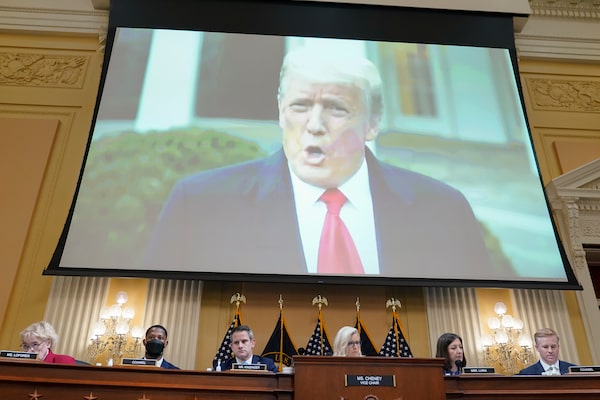
A video of former U.S. president Donald Trump speaking on Jan. 6, 2021, is played as the House select committee investigating the Jan. 6 attack on the U.S. Capitol holds a hearing, on July 21.Patrick Semansky/The Associated Press
One evening in 1872, Washington police officer William West pulled over Ulysses Grant for speeding in a horse-drawn buggy. Mr. Grant, then in his first term as U.S. president, had previously been cautioned over his reckless driving. So this time, Mr. West hauled Mr. Grant into the police station. The president posted US$20 in bond and was released. He forfeited the money when he never showed up for court.
This episode is the only known instance of a U.S. president getting arrested. But that could soon change: Leaks to U.S. media this week suggest the Department of Justice’s investigation into the Jan. 6, 2021, attack on the U.S. Capitol is zeroing in on Donald Trump and his circle. And, in a televised interview, Attorney-General Merrick Garland left the door open to charges.
“We will hold accountable anyone who was criminally responsible for attempting to interfere with the transfer, legitimate, lawful transfer of power from one administration to the next,” he told NBC.
If Mr. Trump were indicted, it would break new legal ground. The U.S. Constitution does not specify whether a president can be criminally charged, and there has been no definitive court ruling on the subject.
Richard Nixon, for instance, was pre-emptively pardoned by his successor, Gerald Ford, foreclosing any question of indictment. And Mr. Grant’s case concerned a traffic infraction – and a decision by one police officer – rather than a complex investigation into accusations of political abuse of power.
A 1973 Justice Department memo concluded that a sitting president could not be charged because it would incapacitate the government. A subsequent memo in 2000, however, argued charges could be laid once the president leaves office.
Can the Jan. 6 hearings wake Americans up to the threat to their democracy?
Six key takeaways from Jan. 6 committee’s hearings on Capitol attack
In the event he is indicted, Mr. Trump will almost certainly contend that such a move is unconstitutional, and the Supreme Court will likely weigh in, said Julie Novkov, an expert in judicial politics at the State University of New York at Albany.
The former president could, for instance, argue that his actions are protected by executive privilege. Or he could try to invoke the “double jeopardy” principle because he was already impeached by the House of Representatives, tried and acquitted by the Senate over his role on Jan. 6.
Prof. Novkov contended such arguments would likely not succeed because impeachment is a political process, rather than a judicial one, and so would not legally count as a previous trial. “The weight would seem to fall on the side of allowing charges to proceed,” she said.
Weighing on Mr. Garland would also be the political consequences of such an unprecedented move. While dozens of state governors, city mayors and members of Congress have been charged throughout U.S. history, there has been a long-running reluctance to indict presidents.
“You open that door, any president is vulnerable to prosecution once they leave office. The concern is about political retaliation and the potentially caustic effects on national politics,” said Prof. Novkov, author of the book The Supreme Court and The Presidency.
The buzz around potential charges follows bombshell hearings by the congressional committee investigating Jan. 6. They detailed efforts by Mr. Trump and his circle to put pressure on state legislatures, Justice Department officials and then-vice-president Mike Pence to reverse the results of the 2020 presidential election, which Joe Biden won.
The Washington Post, New York Times and CNN, citing unnamed sources, have reported that Justice Department lawyers in recent days questioned witnesses about Mr. Trump’s role in one aspect of this plan, which entailed trying to substitute slates of fake Trump-supporting electoral college members for Mr. Biden’s electors in several swing states.
Based on the information that has so far emerged at committee, possible charges could include obstruction of an official proceeding – for the efforts to stop Congress from tallying the electoral college votes – and seditious conspiracy, said Jacob Frenkel, a former federal prosecutor who worked on political corruption cases.
If there are any indictments, Mr. Frenkel said he expected they would not be issued until after midterm congressional elections in November. This would allow a case to work its way through the courts before the next presidential election.
The potential precedent that such a case would set might make this the most significant decision ever to confront an attorney-general, said Mr. Frenkel, now with the firm Dickinson Wright. The department would have a very high burden of proof to meet, so would not lay charges unless it was confident of winning convictions.
“The decision about whether to prosecute the former president will include the question about whether any one person is ‘above the law,’ ” he wrote in an e-mail. “A conviction would be as powerful a message of the U.S. being a country that enforces the law as would be the devastating perception that would attach to an acquittal.”
The Jan. 6 committee is expected to release a report in the fall and could also make a criminal referral to the Justice Department. Mr. Garland, however, is under no obligation to wait for such a referral to begin his own investigations.
The department has charged hundreds of Jan. 6 rioters, as well as leaders of far-right groups accused of planning the attack. Previously, however, it has showed little indication anyone from Mr. Trump’s immediate circle was under investigation, to the consternation of some members of the committee.
“The Department of Justice needs to look at any possible criminality,” Congressman Adam Kinzinger told CNN this week. “What have they been doing for the last year and a half?”
Jonathan Michael, a constitutional law professor, said much of the difficulty in deciding whether to prosecute a president comes from fear of the judiciary being seen to interfere in politics. This is particularly the case because the attorney-general is appointed by the president. Mr. Trump would be certain to use an indictment as further evidence the “deep state” is out to get him.
But all this is outweighed by the need to stop Mr. Trump or other future politicians from ever trying to overturn another election, contended Prof. Michael, who teaches at the University of California, Los Angeles.
“The situation we find ourselves in today is unique. We’ve never had such compelling evidence of complicity with something in the realm of fraud, violence and disruption of the electoral process. We have a figure who is entirely unrepentant and continues peddling these lies,” Prof. Michael said. “Absent an intervention now, it’s very likely to repeat itself.”
Our Morning Update and Evening Update newsletters are written by Globe editors, giving you a concise summary of the day’s most important headlines. Sign up today.
 Adrian Morrow
Adrian Morrow